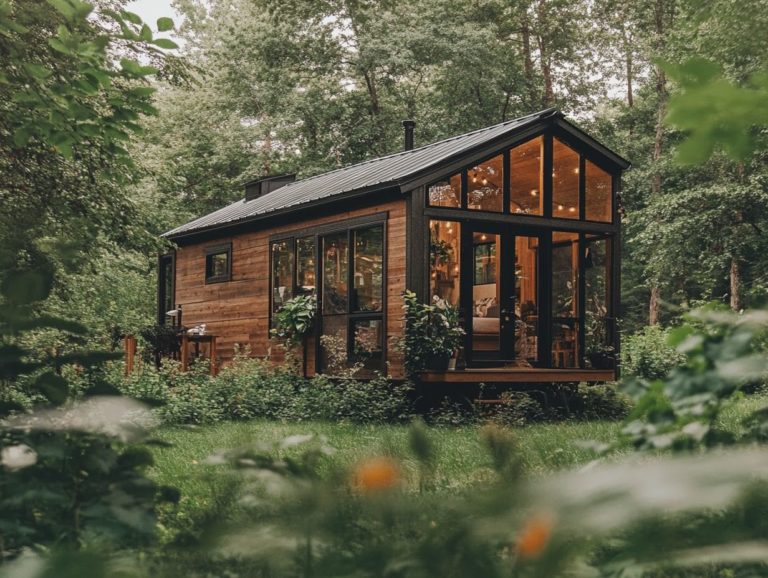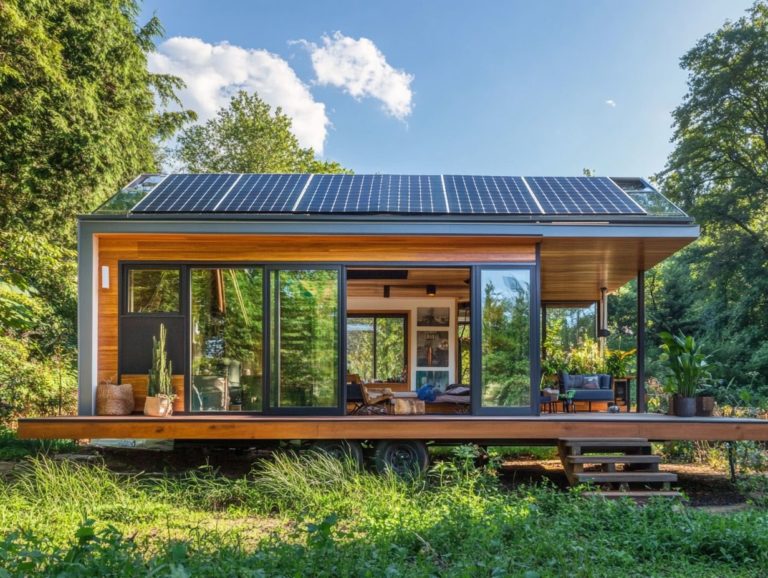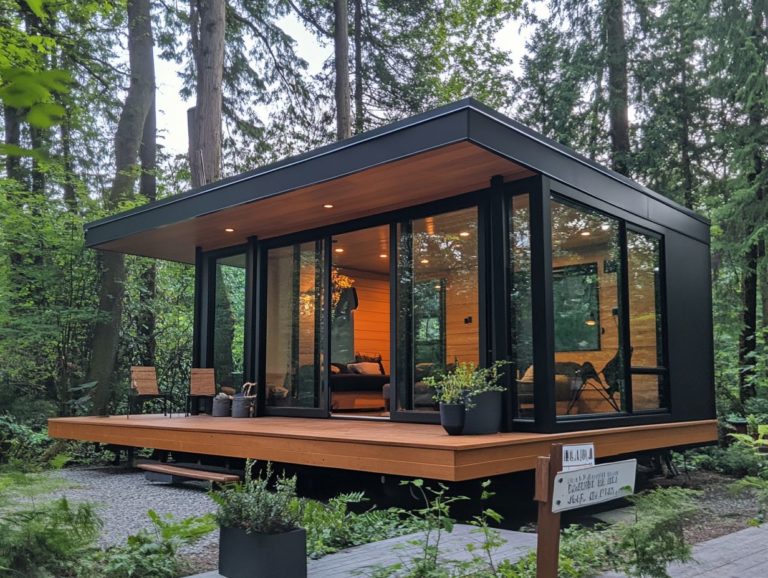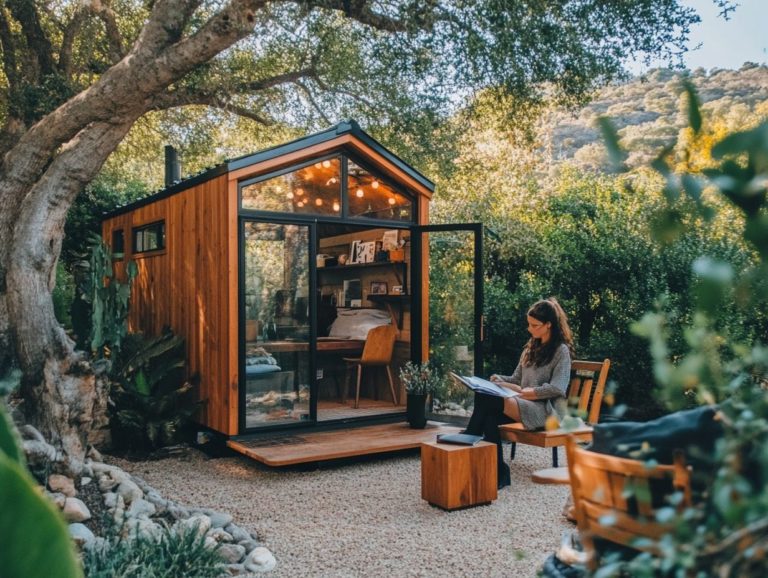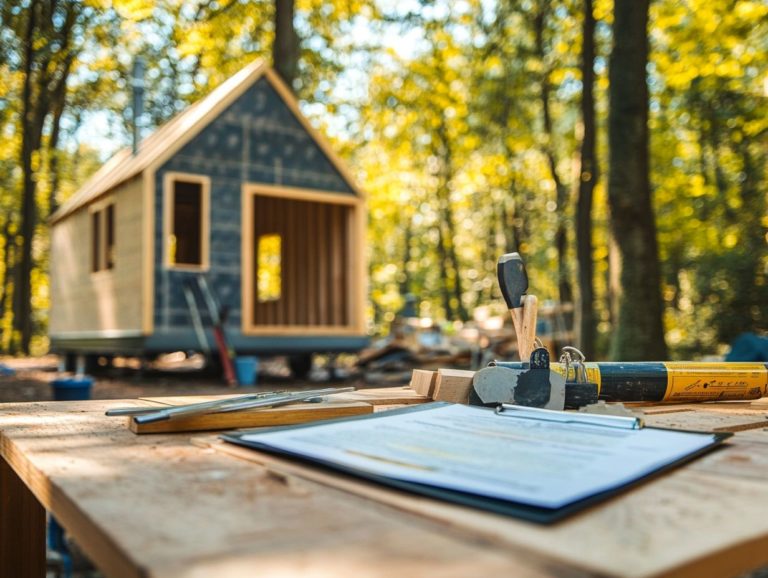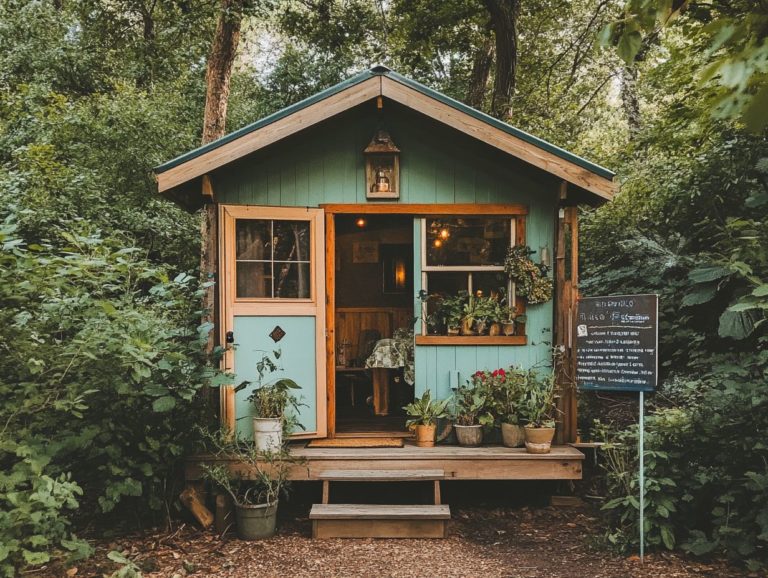Legal Aspects of Tiny House Off-Grid Living
Tiny house off-grid living beautifully marries the allure of minimalist architecture with the liberating essence of self-sufficiency.
As you embark on your journey towards a sustainable lifestyle, grasping the legal landscape becomes essential. From zoning and building codes to permits and regulations, navigating these requirements can initially seem overwhelming.
The benefits include both environmental and financial gains that are compelling. This exploration delves into the challenges associated with tiny house off-grid living, offering practical tips to ensure you remain compliant.
Explore the amazing rewards of this fulfilling lifestyle!
Contents [hide]
- Key Takeaways:
- Overview of Tiny House Off-Grid Living
- Legal Considerations for Tiny House Off-Grid Living
- Benefits of Off-Grid Living
- Challenges of Off-Grid Living
- Navigating Legal Issues
- Frequently Asked Questions
- What legal rules apply when living off-grid in a tiny house?
- Do I need a building permit to construct a tiny house off-grid?
- Are there specific zoning laws for tiny house off-grid living and downsizing?
- Can I legally live in a tiny house off-grid on public land, or must I consider land leasing and rental agreements?
- Are there any tax implications for living in a tiny house off-grid?
- What are my rights as a tiny house off-grid homeowner in terms of insurance policies and home safety?
Key Takeaways:
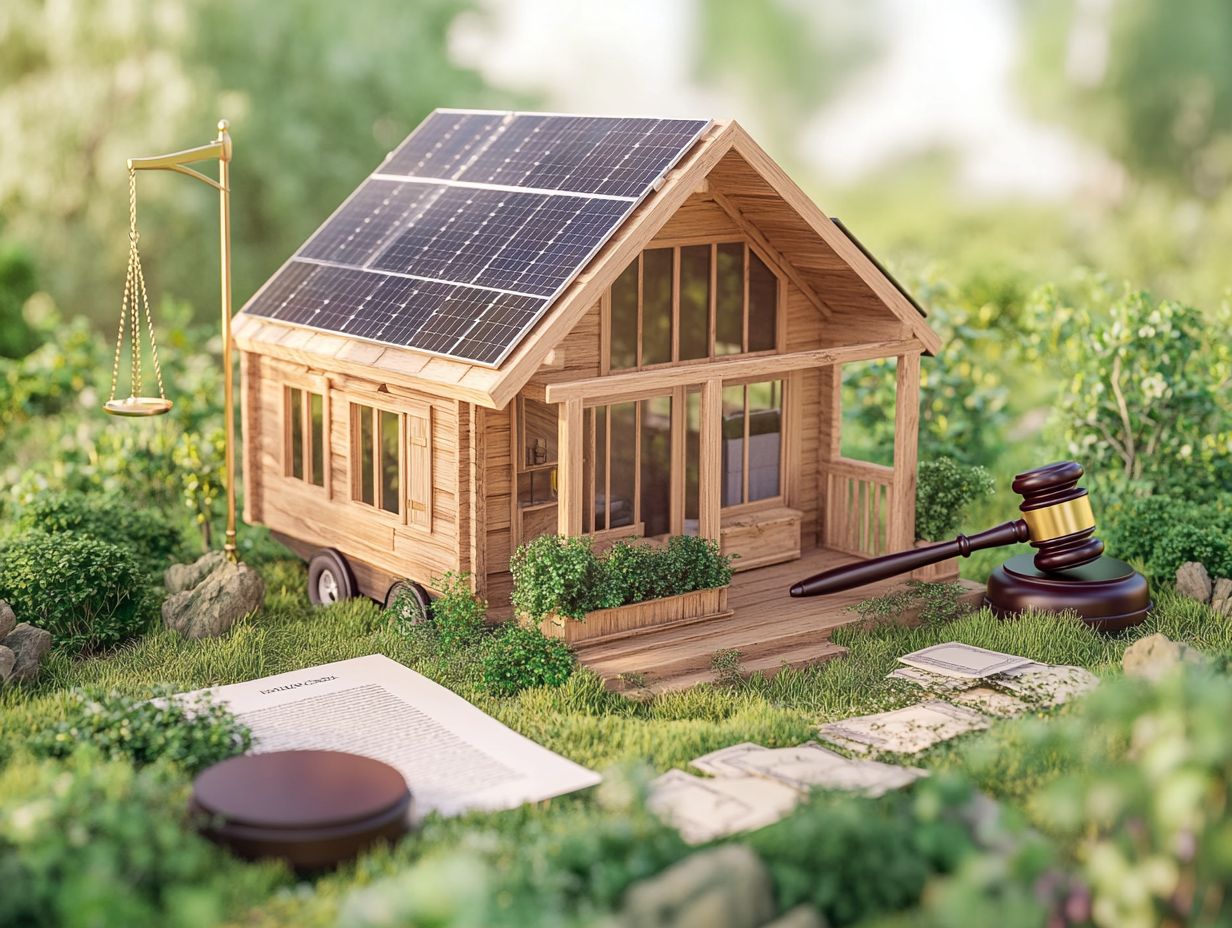
- Off-grid living in a tiny house can offer financial and environmental benefits, but it’s important to understand the legal considerations and challenges that come with it.
- Zoning and building codes, as well as permits and regulations, vary by location and can impact the feasibility of off-grid tiny house living.
- To stay compliant and avoid legal issues, it’s crucial to research local laws, obtain necessary permits, and address common challenges such as waste disposal and utilities.
Overview of Tiny House Off-Grid Living
Tiny house off-grid living offers you a pathway to a simpler, more sustainable lifestyle, inviting you to embrace minimalism and self-sufficiency through innovative and creative designs. This movement has gained momentum as many seek to downsize and break free from the limitations of traditional property ownership. Various tiny house communities exemplify these values.
The allure of tiny homes lies in their seamless blend of comfort and sustainability. They present you with the chance to enjoy a clutter-free existence while adhering to the principles of off-grid living. Here, residents often turn to renewable energy sources and foster strong community bonds, enhancing the overall experience.
Defining Off-Grid Living and Tiny Houses
Off-grid living represents a lifestyle choice that minimizes your reliance on public utilities, which are services like water, electricity, and gas provided by local companies. This perfectly aligns with the tiny house movement’s emphasis on efficient design and sustainable living.
This lifestyle encourages you to construct a self-sufficient habitat that prioritizes resource conservation and embraces minimalism. By incorporating features like solar panels for energy independence and rainwater collection systems for sustainable water, tiny houses are ideal candidates for off-grid setups.
This blend allows you to embrace a simpler existence while significantly reducing your carbon footprint. The smaller space cultivates a mindful approach to consumption, highlighting the importance of quality over quantity in your daily life. Together, these elements create a harmonious relationship that champions sustainability and fosters a deeper connection with nature.
Legal Considerations for Tiny House Off-Grid Living
Navigating the legal landscape of tiny house off-grid living can be quite the endeavor for aspiring tiny house owners like you. It s essential to grasp the intricacies of various building codes, zoning laws, and local ordinances that determine the legality of your home.
These legal considerations vary significantly from state to state, creating a complex tapestry of rules you must follow that can affect everything from foundation requirements to utility hookups. Understanding these nuances is vital for anyone wishing to fully embrace the tiny house movement while ensuring their lifestyle remains firmly within the legal framework.
Ready to start your tiny house journey? Learn more about local laws today!
Zoning and Building Codes
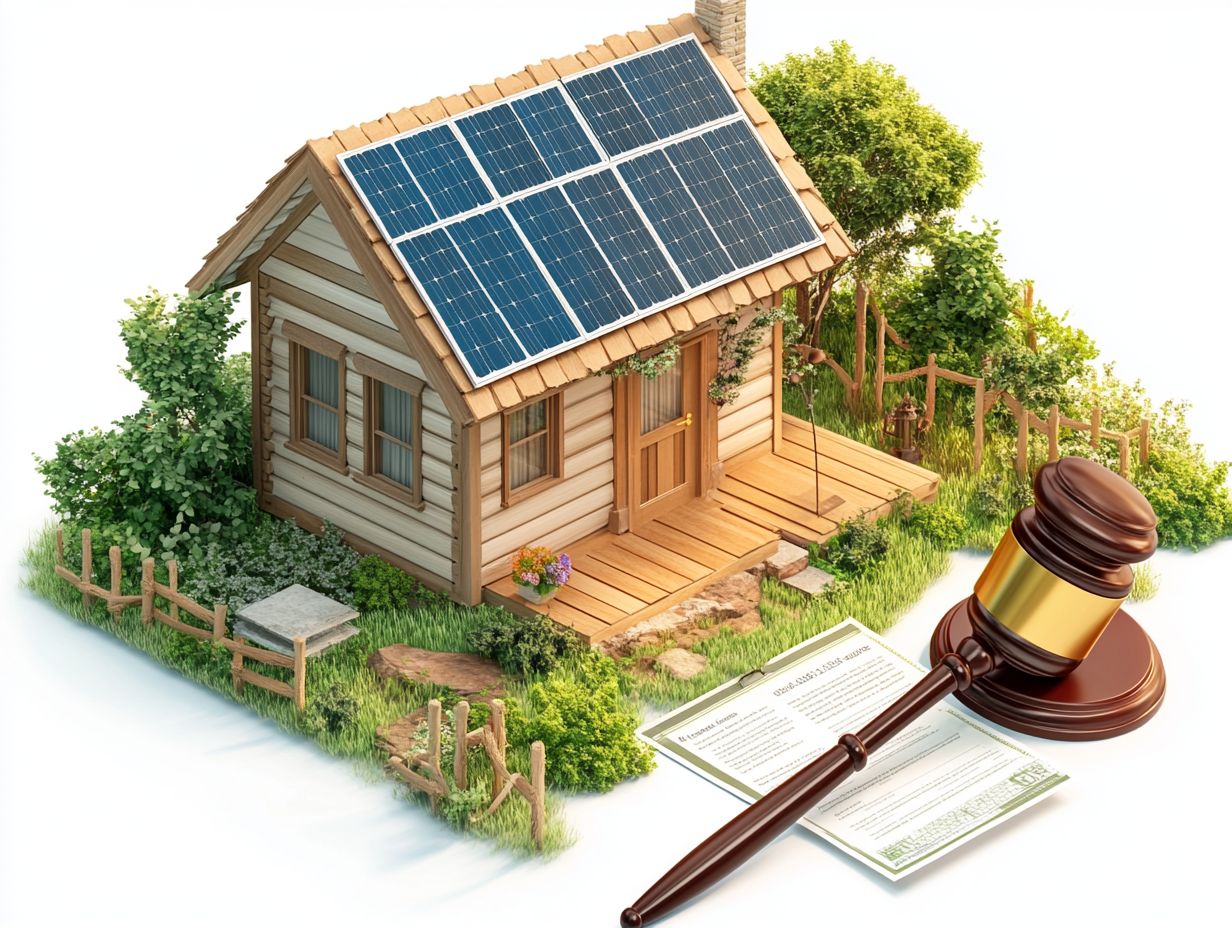
Zoning laws and building codes play a pivotal role in determining how and where you can build your tiny house. These often differ dramatically based on local government regulations.
These regulations influence various aspects of tiny house construction, including foundation requirements and utility hookups. For example, in California, tiny houses built on foundations can qualify as permanent residences. In contrast, Texas permits movable tiny homes on trailers, as long as they stay within designated zoning areas. Additionally, many are exploring living off-grid in tiny house communities for a more sustainable lifestyle.
In Florida, you ll encounter stringent utility connection requirements. Tiny homeowners must comply with the same codes as traditional homes for safety and sanitation.
Understanding these regional nuances is essential for anyone contemplating a tiny home build. Non-compliance can lead to fines or worse, the removal of your cherished structure.
Permits and Regulations
Obtaining the necessary permits and adhering to regulations is essential for you as a tiny house owner. This ensures that your off-grid living setup is both legally compliant and safe.
This critical first step helps you navigate the often complex landscape of local zoning laws and protects your investment.
Securing the right permits helps you avoid legal disputes stemming from non-compliance. Such disputes might lead to fines or even the forced removal of your beloved structure.
Understanding insurance requirements is equally crucial, as many policies demand proof of compliance with local codes before they ll consider offering coverage.
Staying informed and proactive in this permitting process fosters trust within your community and enhances the long-term viability of tiny house living.
Benefits of Off-Grid Living
Embracing off-grid living opens the door to exciting advantages, from environmental sustainability to significant financial savings. This lifestyle becomes an appealing choice for those seeking to simplify their lives through the concept of tiny living.
It allows for a deeper connection with nature and one s own values.
Environmental and Financial Benefits
The environmental benefits of off-grid living in tiny homes are striking. You can achieve a remarkable reduction in energy consumption and waste production, translating to a smaller carbon footprint.
By embracing renewable energy sources like solar panels and wind turbines, you significantly lessen your reliance on fossil fuels. This choice not only preserves natural resources but also contributes to cleaner air for everyone.
For instance, switching to solar energy can reduce your electricity bills by an impressive 70%. This presents a compelling financial incentive alongside your commitment to the environment.
Take the Schild family in Oregon, for example. They ve demonstrated that enhancing energy independence goes hand-in-hand with enjoying lower monthly utility costs and achieving true energy self-sufficiency.
The use of composting toilets and rainwater harvesting systems further illustrates a strong commitment to sustainability.
Ultimately, off-grid living emerges as a viable alternative that champions both ecological integrity and financial well-being.
Challenges of Off-Grid Living
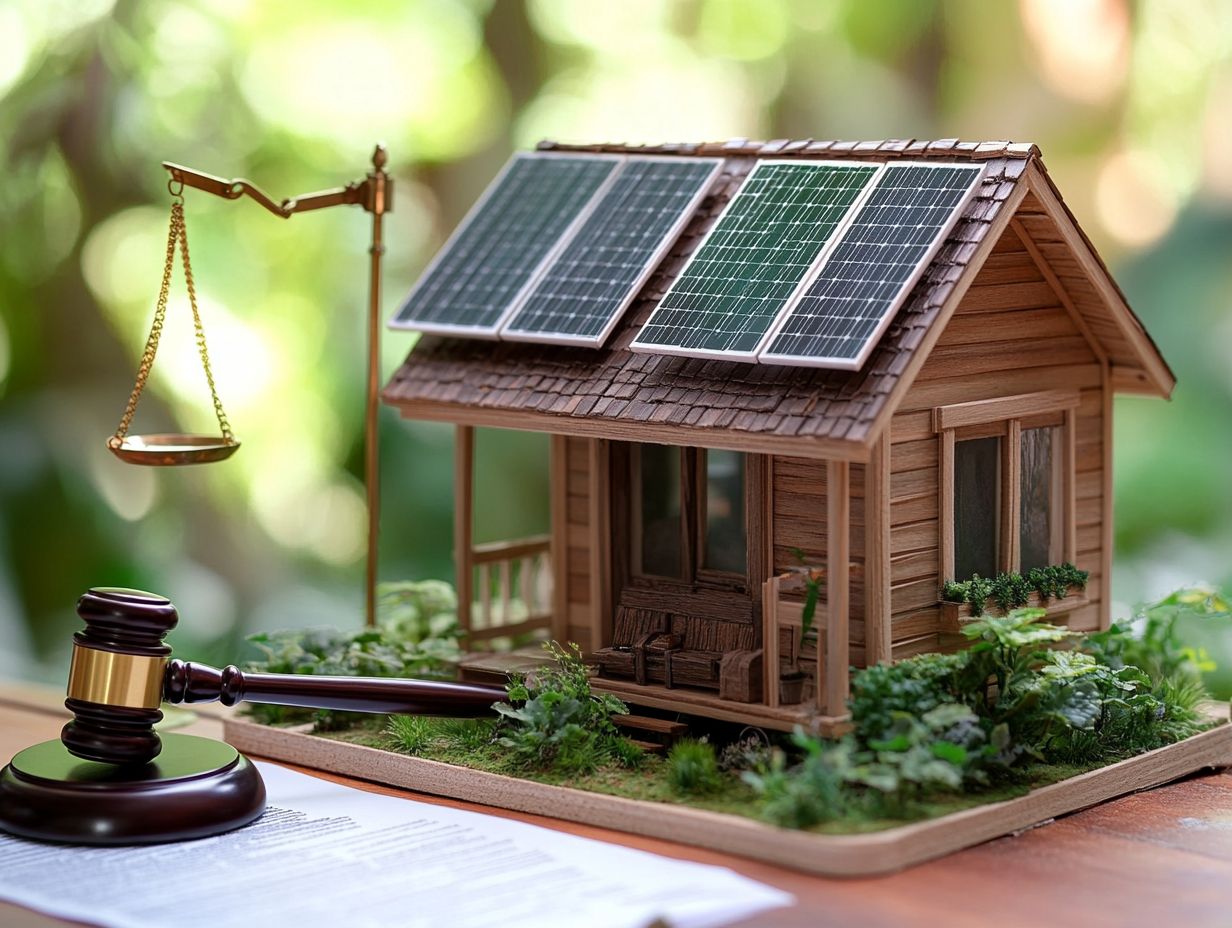
Off-grid living in a tiny house offers a myriad of benefits, yet it also introduces particular challenges that you should contemplate as a prospective tiny house owner.
It’s essential to pay attention to legal considerations and utility hookups, as these factors can significantly impact your experience.
Addressing Common Challenges
Addressing the common challenges faced by tiny house owners requires a keen understanding of the intricacies surrounding owning land, insurance requirements, and local regulations.
These complexities can feel overwhelming, particularly for those making the shift to off-grid living. One significant hurdle you may encounter is securing homeowners insurance designed for small homes, as many traditional insurers may not be well-acquainted with such arrangements.
Navigating land leases requires careful research since not all properties are equally conducive to tiny homes, especially in rural settings.
Adhering to local zoning laws and building codes is essential. For practical insights, engage with forums and online communities where seasoned tiny house owners share invaluable resources and tips. Additionally, understanding tiny house living and the importance of zoning can be beneficial. Talk to local authorities for clarity on regulations. This helps ensure a smooth transition to off-grid living.
Navigating Legal Issues
Navigating legal issues is crucial for tiny house owners like you. It ensures compliance with local ordinances and helps you grasp the complexities of tiny house legality, particularly given the variations across different jurisdictions.
Tips for Staying Compliant
Staying compliant with legal considerations surrounding zoning laws and building codes is essential for anyone involved in the tiny house movement. Adherence to these regulations not only sustains your living situation but also maintains its legality.
This means you must stay on top of changing regulations! Regularly check updates from municipal websites or subscribe to relevant newsletters to keep informed about any policy changes that could affect you.
Don t hesitate to seek assistance from local government officials; they can clarify specific requirements and help you navigate the bureaucracy. Engaging with community support groups whether online or in person can significantly enhance your awareness and foster an environment where shared experiences lead to effective compliance strategies.
Frequently Asked Questions
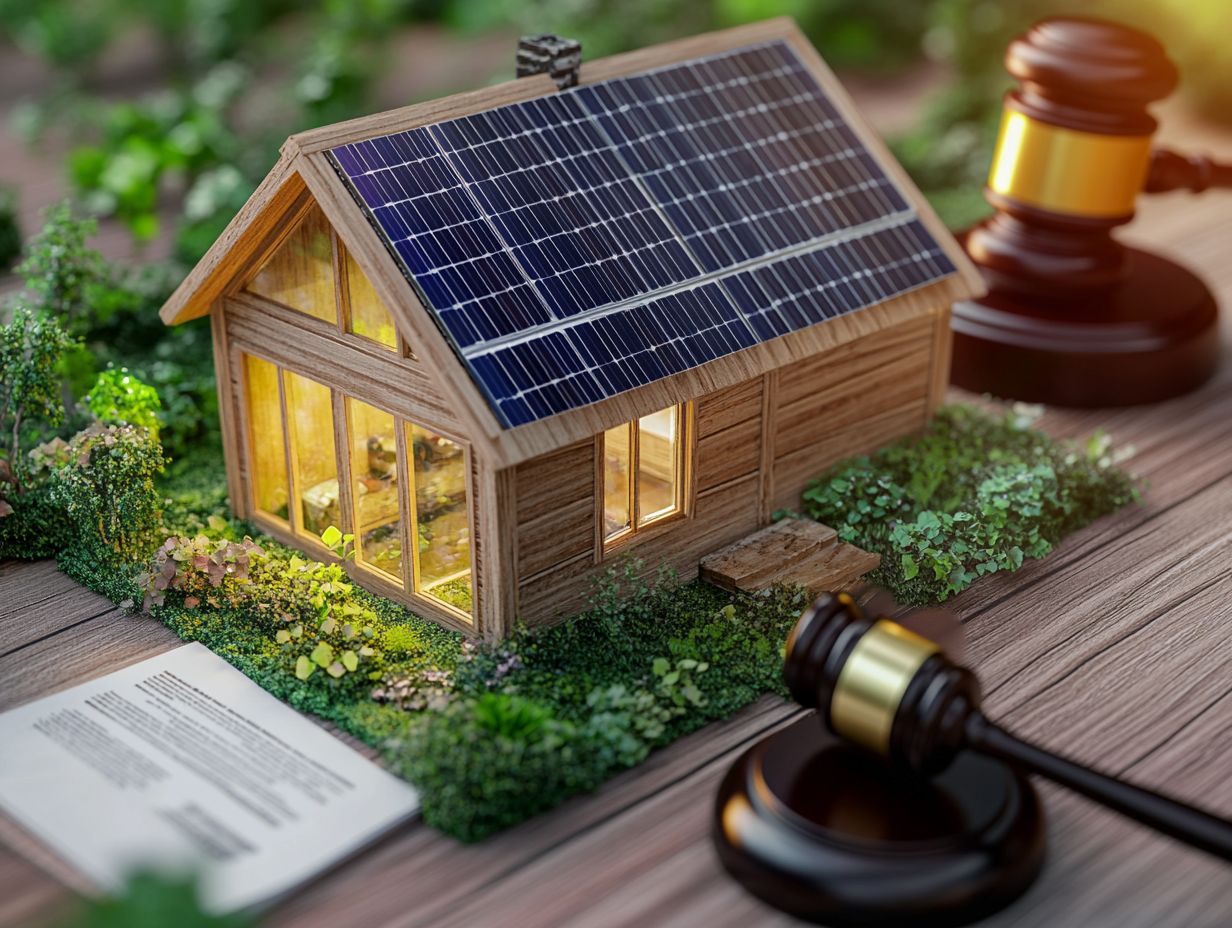
What legal rules apply when living off-grid in a tiny house?
Living in a tiny house off-grid involves several legal aspects such as zoning laws, building codes, and land use regulations. It is crucial to research and understand these laws before embarking on this lifestyle.
Do I need a building permit to construct a tiny house off-grid?
Yes, in most cases, you will need a building permit to construct a tiny house off-grid. The requirements for a permit may vary depending on your location, so it is best to check with your local authorities.
Are there specific zoning laws for tiny house off-grid living and downsizing?
Yes, there may be specific zoning laws that apply to tiny house off-grid living. These laws may dictate the type of land you can build on, the size and height of your tiny house, and whether it can be used as a primary residence.
Can I legally live in a tiny house off-grid on public land, or must I consider land leasing and rental agreements?
Generally, it is not legal to live in a tiny house off-grid on public land without a permit or lease. However, some states and counties may have designated areas for off-grid living, so it is essential to research and obtain necessary permits before doing so.
Are there any tax implications for living in a tiny house off-grid?
The tax implications of living in a tiny house off-grid may vary depending on your location. In some areas, you may be required to pay property taxes, while in others, you may be exempt. It is advisable to consult a tax professional for specific information.
What are my rights as a tiny house off-grid homeowner in terms of insurance policies and home safety?
As a tiny house off-grid homeowner, you have the right to use your property for legal purposes and enjoy your chosen lifestyle. However, it is essential to be aware of any local laws and regulations that may affect your rights as a homeowner.
Ready to start your tiny house journey? Connect with local groups today!

